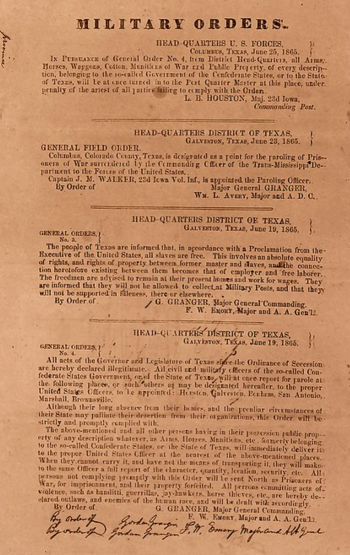Juneteenth
National Independence Day) is a federal holiday in the United States commemorating the emancipation of enslaved African Americans. Deriving its name from combining June and nineteenth, it is celebrated on the anniversary of the order, issued by Major General Gordon Granger on June 19, 1865, proclaiming freedom for slaves in Texas. Originating in Galveston, Juneteenth has since been observed annually in various parts of the United States, often broadly celebrating African-American culture.
Early celebrations date to 1866, at first involving church-centered community gatherings in Texas.
Former slaves in Galveston rejoiced after General Order No.3. One year later, on June 19,1866, freedmen in Texas organized the first of what became annual commemorations of "Jubilee Day". Early celebrations were used as political rallies to give voting instructions to newly freed African Americans. Other independence observances occurred on January 1 or 4.
They spread across the South and became more commercialized in the 1920s and 1930s, often centering on a food festival. Participants in the Great Migration brought these celebrations to the rest of the country. During the Civil Rights Movement of the 1960s, these celebrations were eclipsed by the nonviolent determination to achieve civil rights, but grew in popularity again in the 1970s with a focus on African American freedom and African-arts.
Celebratory traditions often
include public readings of the
Emancipation Proclamation, singing traditional songs such as "Swing Low, Sweet Chariot" and "Lift Every Voice and Sing", and the reading of works by noted African-American writers, such as Ralph Ellison and Maya Angelou. Juneteenth celebrations may also include rodeos, street fairs, cookouts, family reunions, parties, historical reenactments, and Miss Juneteenth contests. In 2021, Juneteenth became the first new federal holiday since Martin Luther King Jr. Day was declared.
In the late 1970s, when the
Texas Legislature declared Juneteenth a "holiday of significance... particularly to the blacks of Texas," it became the first state to establish Juneteenth as a state holiday. The bill passed through the Texas Legislature in 1979 and was officially made a state holiday on January 1, 1980. Before 2000, three more U.S. states officially observed the day and over the next two decades it was recognized as an official observance in all states, except South Dakota, until becoming a federal holiday.
As of May 30, 2023, 25 states and the District of Columbia have made Juneteenth a paid holiday for state employees, with the remainder maintaining a ceremonial observance (New Mexico's personnel board declared it a paid worker holiday, although it is not statutory holiday in New Mexico)

National Independence Day) is a federal holiday in the United States commemorating the emancipation of enslaved African Americans. Deriving its name from combining June and nineteenth, it is celebrated on the anniversary of the order, issued by Major General Gordon Granger on June 19, 1865, proclaiming freedom for slaves in Texas. Originating in Galveston, Juneteenth has since been observed annually in various parts of the United States, often broadly celebrating African-American culture.
Early celebrations date to 1866, at first involving church-centered community gatherings in Texas.
Former slaves in Galveston rejoiced after General Order No.3. One year later, on June 19,1866, freedmen in Texas organized the first of what became annual commemorations of "Jubilee Day". Early celebrations were used as political rallies to give voting instructions to newly freed African Americans. Other independence observances occurred on January 1 or 4.
They spread across the South and became more commercialized in the 1920s and 1930s, often centering on a food festival. Participants in the Great Migration brought these celebrations to the rest of the country. During the Civil Rights Movement of the 1960s, these celebrations were eclipsed by the nonviolent determination to achieve civil rights, but grew in popularity again in the 1970s with a focus on African American freedom and African-arts.
Celebratory traditions often
include public readings of the
Emancipation Proclamation, singing traditional songs such as "Swing Low, Sweet Chariot" and "Lift Every Voice and Sing", and the reading of works by noted African-American writers, such as Ralph Ellison and Maya Angelou. Juneteenth celebrations may also include rodeos, street fairs, cookouts, family reunions, parties, historical reenactments, and Miss Juneteenth contests. In 2021, Juneteenth became the first new federal holiday since Martin Luther King Jr. Day was declared.
In the late 1970s, when the
Texas Legislature declared Juneteenth a "holiday of significance... particularly to the blacks of Texas," it became the first state to establish Juneteenth as a state holiday. The bill passed through the Texas Legislature in 1979 and was officially made a state holiday on January 1, 1980. Before 2000, three more U.S. states officially observed the day and over the next two decades it was recognized as an official observance in all states, except South Dakota, until becoming a federal holiday.
As of May 30, 2023, 25 states and the District of Columbia have made Juneteenth a paid holiday for state employees, with the remainder maintaining a ceremonial observance (New Mexico's personnel board declared it a paid worker holiday, although it is not statutory holiday in New Mexico)


